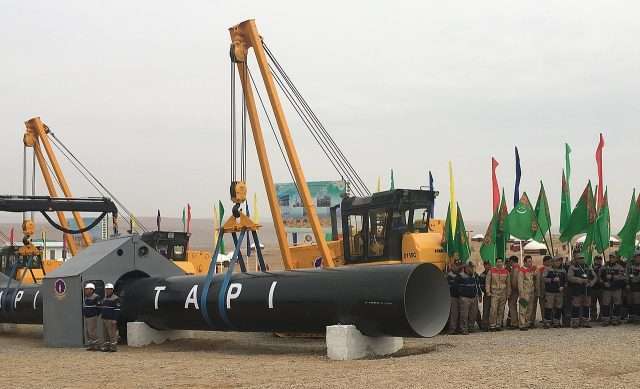India and Turkmenistan discussed the Afghanistan situation and the TAPI natural gas pipeline project

Author: Silvia Boltuc
The Turkmenistan-India meeting highlighted Afghanistan’s role in Ashgabat and New Delhi’s foreign policy and regional strategy and the importance of the TAPI project for Turkmen and Indian economies.
On April 1st, 2022, the President of India, Ram Nath Kovind, arrived in Ashgabat on an official visit and met with the President of Turkmenistan, Serdar Berdimuhamedov. The parties discussed the current situation in Afghanistan and the prospects of the Turkmenistan-Afghanistan-Pakistan-India (TAPI) natural gas pipeline project.
According to the Turkmen state news agency, Berdimuhamedov called for the active involvement of Afghanistan in regional and international infrastructure projects. He also supported the provision of international assistance to the Afghan people in the development and restoration of the social sphere. In turn, Kovind stressed the need to form an inclusive government and respect the rights of all Afghans, Indian media noted.
The parties also exchanged views on the construction of the TAPI natural gas pipeline project. Berdimuhamedov stressed that Turkmenistan “counts on India’s principled and effective position, its readiness to make a significant contribution to the synchronisation and efficiency of the work of all TAPI participants”. Meanwhile, Kovind focused on ensuring the project’s safety and suggested that this issue be considered at the expert level.
Risk Assessment
Turkmenistan must realise the TAPI pipeline project because the Turkmen economy depends on natural gas export. In this framework, the Turkmen authorities should find a solution to secure and guarantee that the Afghan section of the TAPI pipeline will be built and defended from potential internal and external threats. Since the Taliban took power in August 2021, Turkmenistan has attempted to establish good relations with the Taliban interim Government encouraging cooperative projects.
India’s Government is attempting to increase the share of natural gas in the primary energy basket from the current 6.2% to 15% by 2030. In 2021, India’s gas consumption reached 174 million metric standard cubic meters per day, mainly from fertiliser plants, city gas networks, and power units. Of this, 49 per cent is met by domestic production and the rest through imports in the form of liquefied natural gas (LNG). The TAPI project will support Indian natural gas rising demand, particularly in the Indian fertiliser industry and power production.
The Taliban interim Government needs to establish relations with regional actors to seek formal recognition and contrast the socio-economic problems affecting Afghanistan since September 2021. In this regard, the TAPI natural gas pipeline project might help the Afghan economy and, at the same time, send a message to the international community that the Taliban interim Government can create the right conditions for foreign investments in infrastructural projects.
On the other hand, security and stability are the main concerns over the Afghan section of the TAPI project since the Islamic State Khurasan (ISKP) has conducted several violent attacks in Afghanistan against the Taliban and civilians and, in the near future, might represent the principal threat to the Taliban economic strategy and foreign policy (In Afghanistan drug trafficking and terrorism are increasing among regional concerns; Mapping and monitoring terrorist activities in Afghanistan in 2021).
Indeed, the Islamic State Khurasan (ISKP) published recently a video in which accused the Taliban to be “Pakistani proxies serving the Inter-Service Intelligence (ISI) and the Central Intelligence Agency (CIA)” and threatened the Taliban’s relations with Russia, China and Pakistan (Islamic State Khurasan published a video targeting Taliban government’s ties with the international community).
In March 2022, the Islamic State announced the appointment of the new “Caliph” Abu Al-Hassan al-Hashimi Al-Quraysh and then the Islamic State Khurasan (ISKP) pledged allegiance to the new leader (Islamic State’s new leader and future threats in Eurasia). As we noted before, the Islamic State might increase its violent attacks and terrorist activities in April-May 2022 and harshly hit Afghanistan during the months, which might see more military activities conducted by the National Resistance Front of Afghanistan (NRF).
Afghanistan’s security and stability, linked to the Taliban’s ability to contrast terrorist organisations’ presence and activities on the Afghan territory, hugely influence the TAPI natural gas project’s future and Turkmenistan and India’s economic strategies and regional approaches.
If you are interested in discovering more about the TAPI natural gas project or Afghanistan’s current situation, you can contact our team at this Link or attend our Webinar “Afghanistan: interessi geopolitici, crisi umanitaria e sicurezza”.
